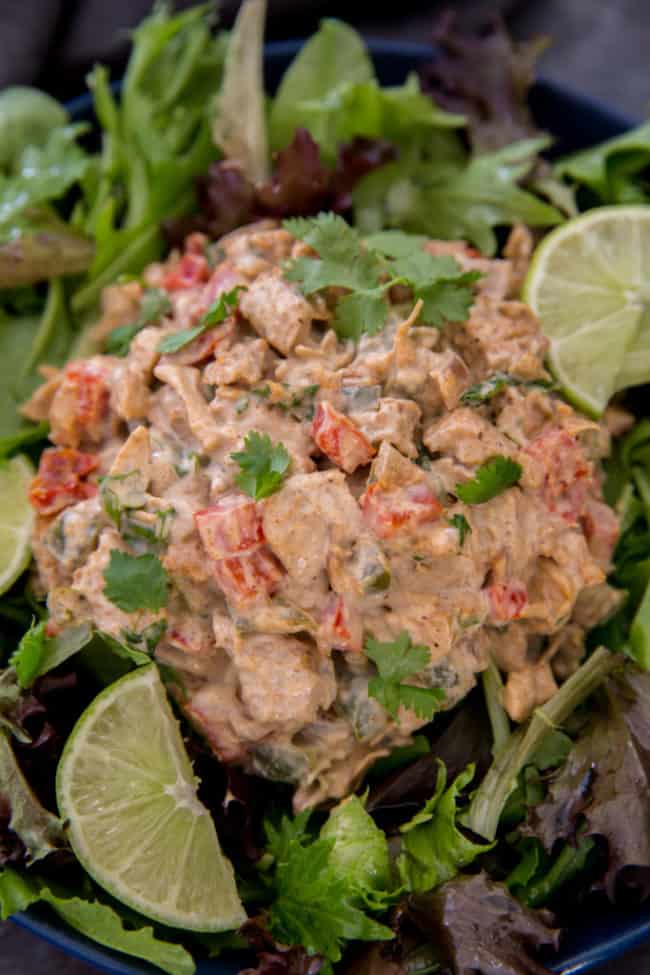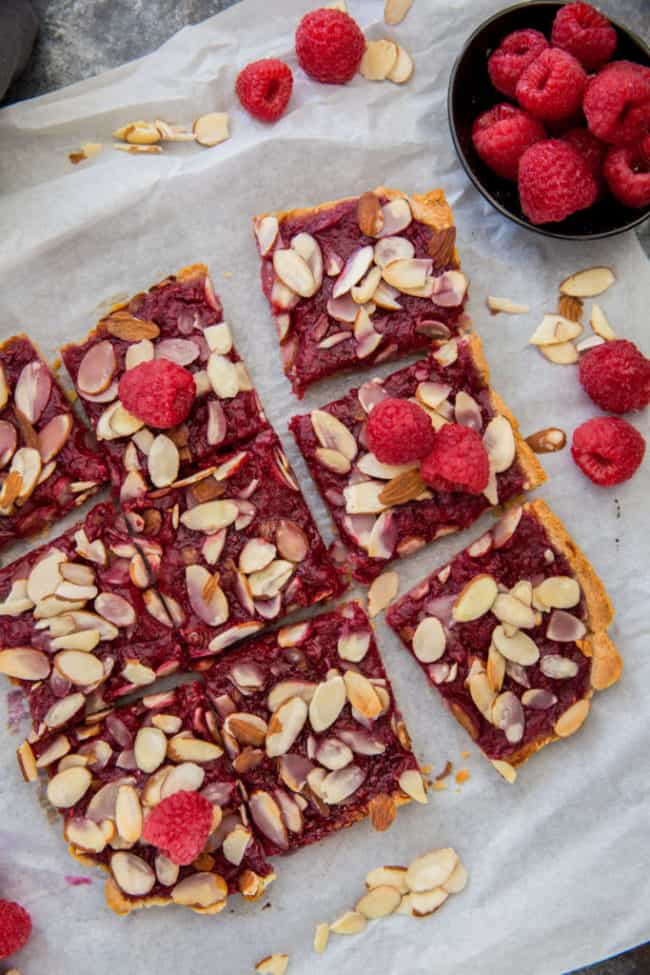We have two separate keto pie crust recipes for you here. One is sweet, and the other is a savory keto pie crust which can be used for quiches or savory pies. Both recipes are very easy to make and extremely tasty! As always, the recipe video will help you get the technique right if you’re having trouble.
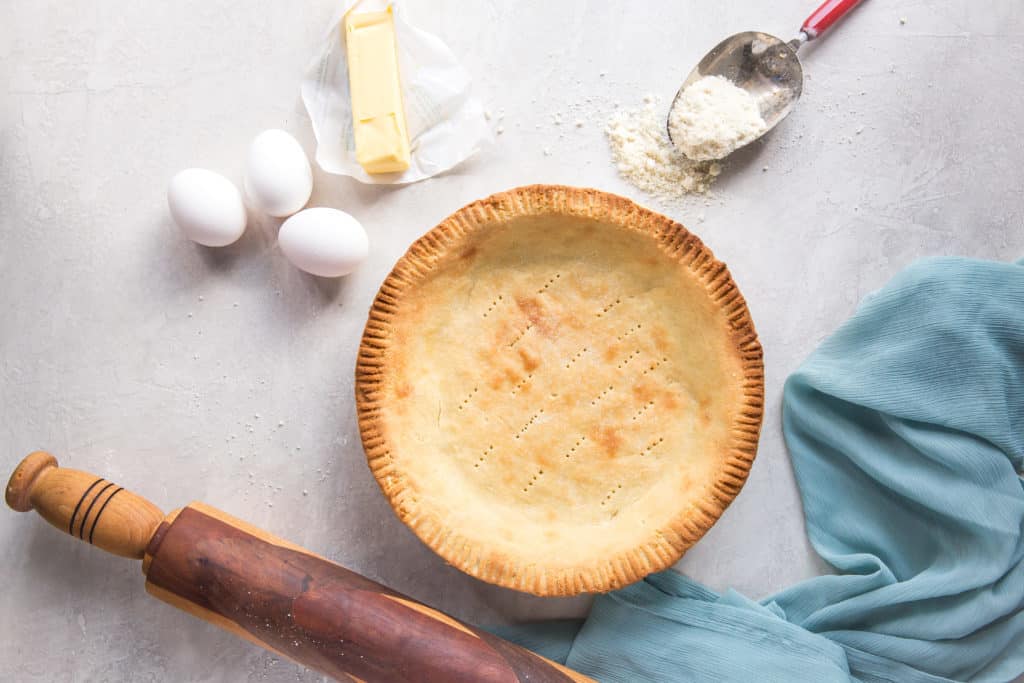
How to Make a Keto Pie Crust
Now, you may be wondering why it takes two flours to make a crust. For a long time I was truly determined to keep the crusts as simple as possible, either coconut flour or almond flour. However, after hundreds of recipes I realized a sturdy crust makes ALL the difference. The right combination of almond flour and coconut flour is crucial to achieving the very best pie crust.
Temperature is Everything!
When you’re working with these pie crusts and trying to form them to your pie pan, having them at the right temperature is critical. Once the pie crust dough is formed, put it in the fridge for about an hour, or the freezer for 30 minutes before trying to roll it out. If you’re having trouble working with this dough it is because it is too warm or too cold.
Use Cold Butter
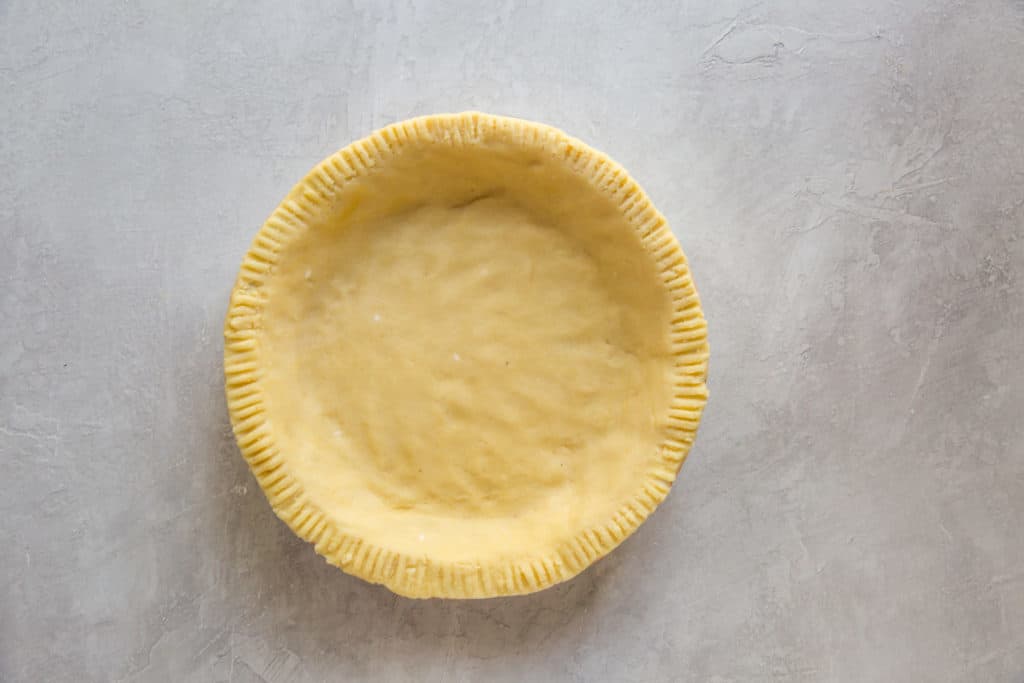
Most pie crusts, and really any sort of baked good that is going for a flaky consistency will call for cold butter. Some magic happens when the cold butter goes into the hot oven that makes any pie crust, even a keto pie crust flaky.
Use Parchment Paper for Rolling Out the Crust
The best way to roll out the crust to the size you need for your pie is to stick it between two sheets of parchment paper. This prevents sticking and helps keep the dough together. Remember, if you’re having trouble with this step your dough is probably not cold enough.
Keep an Eye on the Pie
Keto pie crusts are more prone to burning than traditional crusts. For this reason it is a good idea to check on your crusts every 5-10 minutes. You won’t get much browning when baking the pie crust on its own, but if you use a filling that takes a long time to bake you can run into problems. A good work around for this is to cover the pie edges with foil when it starts to brown.
Use Xanthan Gum for Best Results
Xanthan gum is an ingredient you may want to become familiar with if you plan on baking keto pies, cookies and cakes. Xanthan gum is often used in gluten free baking to provide stickiness and elasticity to doughs. We find that it also improves the final texture of these pie crusts.
Tart Pans Work Best
While your traditional pie pan works fine, we’ve completely switched over to using tart pans for our keto pies. The bottoms are removable so the pie comes out perfect every time and never sticks. We have a set of mini tart pans and a few larger tart pans.
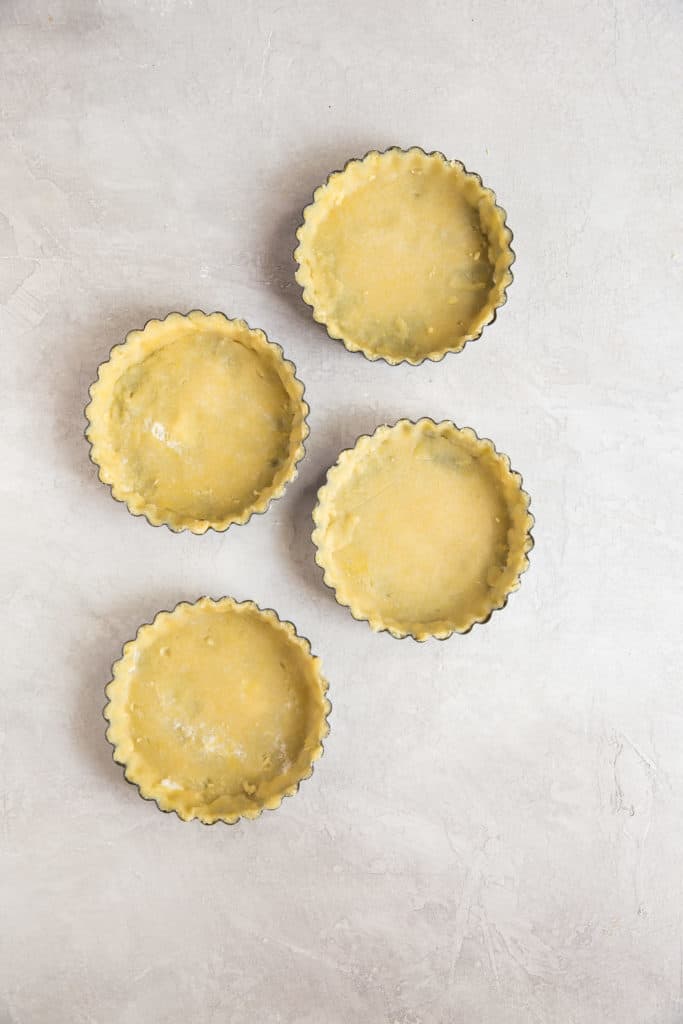
Our Favorite Keto Pie Fillings?
Without a doubt our favorite pie recipe is this low carb pecan pie. Not only is it our favorite but it is one of the most popular recipes on our food blog. Some other classics are:
Most of all, we would like to hear what type of pie you decided to make with these keto pie crust recipes. If you make something awesome tag us on instagram so we can see!
How many carbs are in pie crust?
You might be shocked to find out that a traditional pie crust contains over 100 grams of carbs. These keto friendly pie crust only contain around 1 gram of net carbs per slice, or a total of under 10 grams of carbs per pie! The even better news is that keto pie crusts are one of the few recipes that might actually taste better than the original high carb version.
What is a Keto Crust made out of?
While recipes will vary, a keto crust is typically made of either coconut flour or almond flour. Combining both types of keto flours will make for the absolute best crust, which is what we’ve done for this recipe.
Sweet And Savory Keto Pie Crusts
Either way you go, sweet or savory, you can’t go wrong when using these crust recipes. It’s always great to have some go to recipes in your back pocky, from the perfect keto brownies and cookies, to pie crusts. If you check out the video below you’ll see me devouring the keto pie crusts – they are just that good on their own.
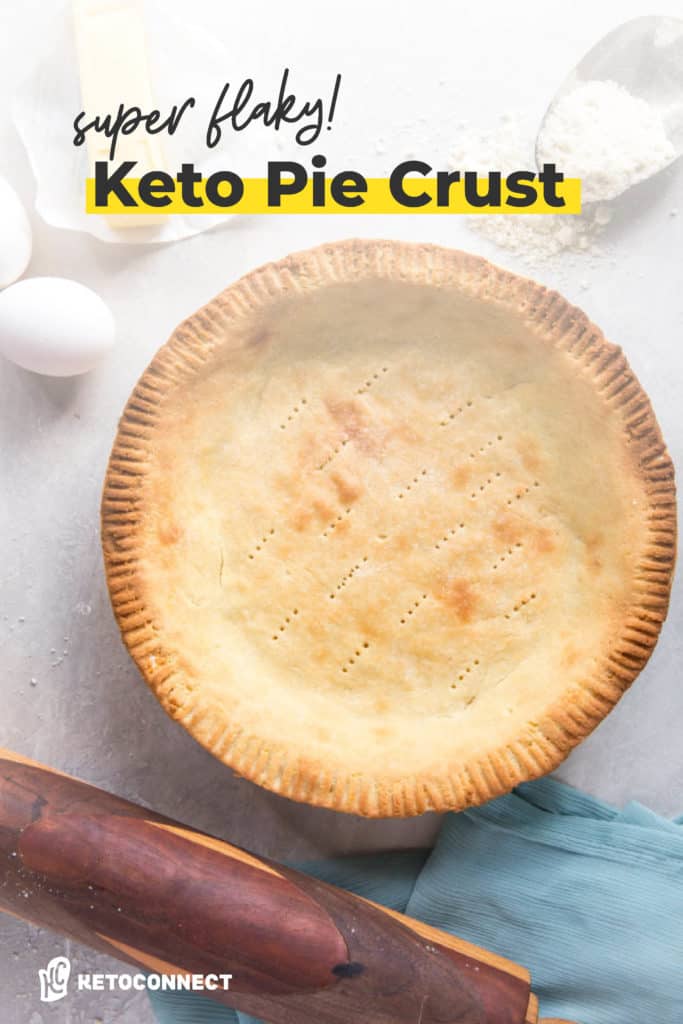
Recipe can be quickly added to MyFitnessPal – Search “KetoConnect – Keto Sweet Pie Crust”
Recipe can be quickly added to MyFitnessPal – Search “KetoConnect – Keto Savory Pie Crust”
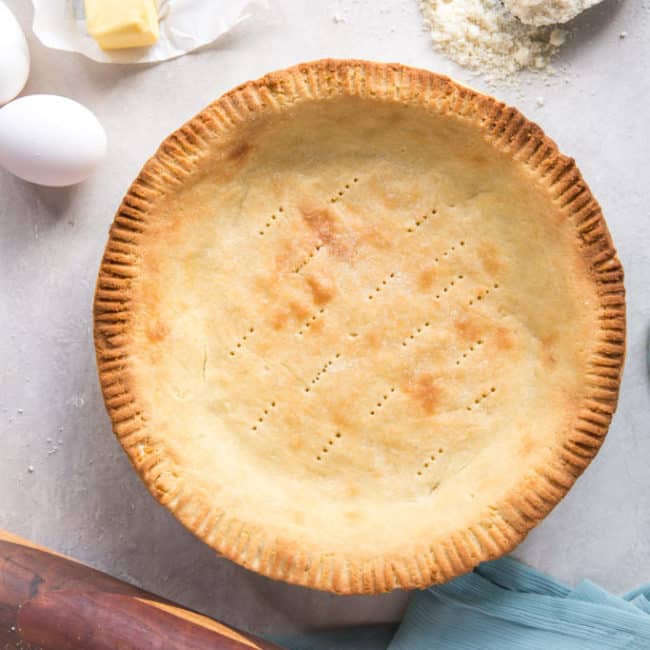
Keto Pie Crusts – Sweet & Savory
What You Need:
Ingredients:
Sweet Crust:
- 1.25 cups almond flour
- 2 tbsp coconut flour
- 1/2 tsp xanthan gum
- 1/4 tsp pink himalayan salt
- 3 tbsp unsalted butter, cold and cubed
- 1/4 cup cream cheese, cubed
- 1 large egg, lightly beaten
- 15 drops liquid stevia
Savory Crust:
- 1 cup almond flour
- 1/4 cup coconut flour
- 1/2 tsp xanthan gum
- 1/2 tsp pink himalayan salt
- 3 tbsp unsalted butter, cold and cubed
- 1 large egg. lightly beaten
- 2 tsp apple cider vinegar
Instructions:
Sweet Crust:
- Add almond flour, xanthan gum, coconut flour and salt to food processor and pulse until evenly combined.
- Add butter and cream cheese cubes and pulse for a few seconds, just until crumbly. Add egg and liquid stevia and pulse until the dough just begins to come together into a ball, being sure not to overwork the dough. The mixture should resemble coarse
- Turn out the dough onto plastic wrap and pat into a ball, then flatten and seal.
- Refrigerate for at least 30 minutes, or up to 3 days. You can also freeze the pie crust and thaw out as needed.
Use Sweet Crust:
- Place cold dough disc between two sheets of parchment paper and, working quickly, gently roll out to desired size.
- Once the dough is in the pie pan or molded into your desired shape (galette, tart, etc.), refrigerate it for 30 minutes (or freeze it for 10-15 minutes) before baking to help it keep its shape.
- Brush it with egg wash, if desired. If baking a pie crust base, prick the base with a fork a few times to keep bubbles from forming.
- Bake at 425 degrees F for 10, then cover the outer crust with a pie shield or a strip of foil. Bake for an additional 3-5 minutes until nicely browned, keeping a close eye on it as grain-free flours can burn rather quickly.
Savory Crust:
- Add flours, xantham gum, and salt to a food processor; pulse until evenly combined.
- Add the butter cubes, egg, and vinegar. Pulse until the dough just begins to come together into a ball, being sure not to overwork it. The mixture should resemble coarse breadcrumbs.
- Turn out the dough onto plastic wrap and pat into a ball, then flatten and seal.
- Refrigerate for at least 30 minutes, or up to 3 days. You can also freeze the pie crust and thaw out as needed.
- Note – pockets of butter are normal.
Use Savory Crust:
- Place cold dough disc between two sheets of parchment paper and, working quickly, gently roll out to desired size.
- Once the dough is in the pie pan or molded into your desired shape (galette, tart, etc.), refrigerate it for 30 minutes (or freeze it for 10-15 minutes) before baking to help it keep its shape.
- Brush it with egg wash, if desired. If baking a pie crust base, prick the base with a fork a few times to keep bubbles from forming.
- Bake at 425 degrees F for 8-10, then cover the outer crust with a pie shield or a strip of foil.
Video:
Notes
Fat: 13g
Protein: 4.3g
Carbs: 4.8g
Fiber: 3g
Net Carbs:1.8g Serving Size: 1/8 pie crust
